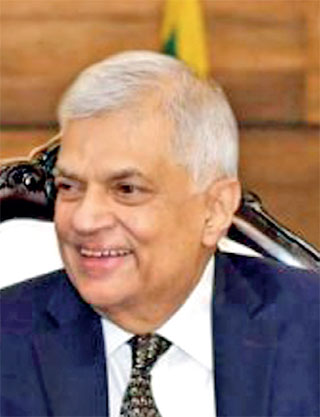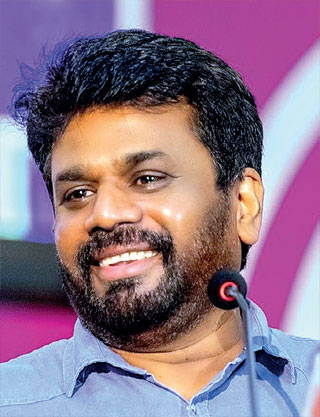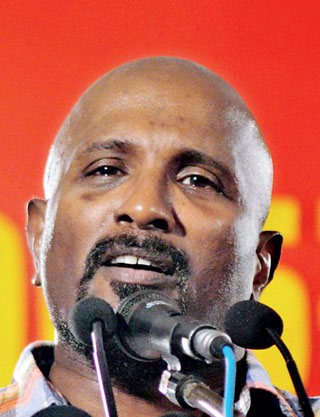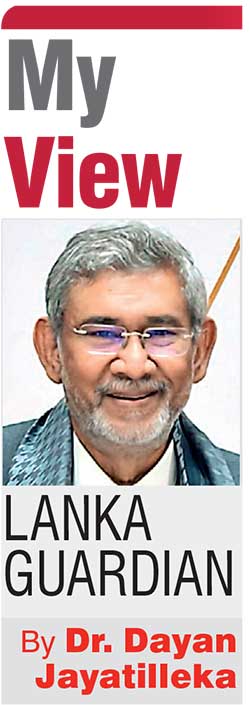Wednesday Feb 25, 2026
Wednesday Feb 25, 2026
Thursday, 10 November 2022 00:35 - - {{hitsCtrl.values.hits}}

President Ranil Wickremesinghe

JVP Leader Anura Kumara Dissanayake

FSP Leader Kumar Gunaratnam
|
 Instead of managing the economic crisis by building consensus among key stakeholders, President Ranil Wickremesinghe has hared-off in two other directions, all within weeks, acting on issues that may be intrinsically important but are certainly not the ones that should be heaped on his plate or that of Parliament at this point in time. Indeed, these two issues will only generate great political dissonance and undermine any possibility of national and social dialogue resulting in consensus on economics.
Instead of managing the economic crisis by building consensus among key stakeholders, President Ranil Wickremesinghe has hared-off in two other directions, all within weeks, acting on issues that may be intrinsically important but are certainly not the ones that should be heaped on his plate or that of Parliament at this point in time. Indeed, these two issues will only generate great political dissonance and undermine any possibility of national and social dialogue resulting in consensus on economics.
One issue is electoral reform, which according to a pronouncement by President Wickremesinghe, is a conditio sine qua non for the holding of any election whatsoever. He has begun to move on that subject through the good offices of his good friend and schoolmate, Prime Minister Dinesh Gunawardena.
The second issue, going by the political column of a reputed Sunday paper, is ‘ethnic reconciliation’. Indeed, the headline announces that ‘President Gives Priority for Ethnic Reconciliation’.
Laudable as it is, this should hardly be the priority of the President at this point in time. In fact, it is something he shouldn’t even touch simply because he has no mandate whatsoever to do so. An unelected President who is playing a caretaker role of seeing out the rest of his term, should hardly be fiddling around with a contentious, emotive issue which is bound to generate legal, legislative and political challenges, including referenda which then become a plebiscite on the Government’s popularity, not the intrinsic worth of the issue at hand. Global experience shows that in times of grave economic crisis, ethno-national reforms are the last things that should be touched because public disaffection takes the form of ethno-majoritarian populism.
Certainly, the long-unresolved ethnic issue requires an urgent reformist solution but should be the task of a newly elected leader and government, not an unelected one heading a deeply unpopular (90%) government.
Dismantling democracy
Instead of taking his battle to the heart of the economic crisis, President Wickremesinghe is trying to take the battle to the heart of the democratic system: regular elections. Elections make Sri Lanka’s political system a functional democracy. Ranil’s repressive actions and misuse of the PTA against protestors have already made it an illiberal democracy. Ranil’s projected, open-ended postponements mean that Sri Lanka’s will no longer be a functional democracy. This also means, as per John Locke, that the legitimate methods of making change would go beyond those that are usable in a functional democracy, and would encompass rebellion.
The overlay of political polarisation atop socioeconomic polarisation will cause an explosive amalgam.
With his intemperate strategic moves of politico-electoral changes and ethno-political ones, Ranil Wickremesinghe is violating one of the most fundamental lessons learned by the world since the 1990s: never undertake structural economic and political transformations simultaneously. That is the lesson China derived from the collapse of the USSR. President Wickremesinghe is going a step further in trying to undertake simultaneously, contentious economic, electoral and ethnic reforms, and doing so without a mandate, i.e., without legitimacy.
The entire IMF-related process has a design flaw in it. Public opinion in the form of a successor administration could very well hold that it is not bound by any agreement with the IMF or the creditors, because the agreement was forced through by an unelected leader, with no popular mandate and therefore legitimacy to do so.
It is an empirically observable global phenomenon that there is a public opinion surge against IMF programs which entail austerity. The social surge is predictable and containable by only one method. Elections, which let off steam and rotate governments. Along the way, many governments and leaders have been overthrown or have resigned, advancing the date of elections. Public protest subsides only with an elected leadership in office which the public believes will cut the best deal possible for the social majority with international players.
What would have happened in such countries had elections not been held? Especially in those with a strong left movement or tradition, there would have been armed rebellion as in the case of the rise of the Zapatistas in Chiapas, Mexico, in 1994 against the North American Free Trade Agreement (NAFTA). The Zapatistas who achieved global fame and influence, pretty much evaporated after they made the mistake of opposing the left populist candidate at the first presidential election that came down the pike.
|
Elections: Solution, delusion or both?
Top policy-makers in the world’s metropolitan centres have known that elections are the necessary condition of de-radicalisation. They have also known that in the global South and even Southern Europe, bringing forward a national election is often the best preventive of radical upheaval and that the more delayed the election, the greater the social polarisation and the more radical the outcome.
This was true of Sri Lanka too. It was the reopening of the electoral process with the Provincial Councils in early 1988 that began to retard the pace of the JVP insurrection, with the presidential election of December 1988 and the parliamentary election of Feb-March 1989 culminating the process of re-legitimising the system.
Radicalisation does not need to take leftist forms, and when they do, they are often better than the alternative, namely a radical rightwing or ultranationalist populism. This was the case in Ceylon in the 1950s. Had the grandfather of the Aragalaya, the hartal of August 1953 in which eight people were shot dead by the Police, been followed either by a socially responsive choice as Prime Minister or by a snap election, we would have avoided Sinhala Only in 1956. An early election would have brought S.W.R.D. Bandaranaike’s SLFP, in alliance with the left parties, or vice versa (with the Left in the pre-eminent role) into office, on a far more enlightened program.
Ranil’s transparent attempts to postpone elections may come as a shock but should be no surprise. Before he took over as leader of the United National Party (UNP) it had an exceedingly democratic constitution, replete with strong grassroots organisations and free and fair internal elections. After he took over the party constitution was revised to confer powers on him which were every bit as excessive as those conferred on the President by the 20th Amendment. UNP reformists led at different times by Sajith Premadasa and Karu Jayasuriya rebelled against this, with Sajith proposing democratising reforms, but to no avail. In 2011, President Mahinda Rajapaksa tilted heavily to Ranil by infamous overnight barricades in the thinly veiled guise of road repair, which prevented many UNP delegates from reaching the venue of the vote.
To this day, having reduced the UNP to zero elected seats in the legislature, Ranil remains the party leader.
By what logic can the Opposition expect him to behave differently now that he has been installed in the room at the top?
The President wrote to the Speaker about the tardiness of parliament in activating the 22nd Amendment’s reforms—which everyone in parliament knows, actually means tossing out the present head of the Elections Commission who seems committed to holding the local authorities election in a few months.
Wickremesinghe’s ‘Segundo’ in the UNP, party chairperson Vajira Abeywardena echoes his leader’s public insistence that wide-ranging electoral reforms – including of the electoral system itself—by means of a Parliamentary Select Committee, must precede any elections at the national level.
Not to be outdone, the SLPP, the ruling party which voted for its old enemy Wickremesinghe in place of its old comrade Dullas Alahapperuma as President, insists that the draft Constitution prepared for President Gotabaya Rajapaksa – a truly totalitarian piece of legislation according to Cardinal Malcolm Ranjith—be given consideration before holding any national election.
How is the Opposition reacting to all of this? The SJB, which consists of the former UNP reformists who failed to reform Ranil’s UNP from within for at least a decade and then quit the party, do not attack their former leader head-on and instead seem to believe, without a shred of evidence or smidgeon of logic to support it, that as President, Ranil will be very different from the autocrat he was and is within the UNP and will hold a parliamentary election in March 2023. Some of the time, some of the SJBers seem willing to accept even the chump change of a local authorities (municipal, pradesheeya sabha) election.
Risking revolution
Global experience and political studies show that the combination of the factors currently accumulating in Sri Lanka can lead to only one outcome. These factors are:
(a) Severe economic crisis and austerity cut-backs
(b) An unelected, arrogant, economic neoliberal leader
(c) A blocked path of electoral change frustrated, receding hopes of an election and
(d) Repressive constriction of space for peaceful protest and agitation.
That sole outcome of such a combination is rebellion. Rebellion could take four forms or some permutation and combination of them:
(i)A rash of riots triggered by a local outrage in the cities, provincial towns and rural areas, which assume the form of mass uprisings.
(ii)Ethnic/ethnoreligious majoritarian nationalist outbursts.
(iii)A radical-patriotic, radical-nationalist or radical leftist military rebellion.
(iv)Armed guerrilla outbreaks, rural and urban.
In his wisdom, President Wickremesinghe may think that provoking a violent rebellion is just the ticket to entrenching autocratic rule and driving an IMF-creditor program through. With a deepening and widening economic crisis, a 90% unpopularity rate, on an island which witnessed three major armed rebellions in under 40 years, when the material and social conditions were far less severe than they are now, and in the aftermath of a massive unarmed upheaval which overturned an ex-military president, I really would not bet on it.
Embittered by the crushing of the Aragalaya dreams and moved by the horrendous deprivation of the people, idealistic young people of all parties, the JVP, FSP, SJB, SLFP and SLPP dissidents, may, irrespective of ideological identities, party structures and strictures of the leaders and elders, may pick up the only instruments and take to the only path of change left to them by the obduracy of President Wickremesinghe and the myopia of their parliamentary leaders who are focused on a receding mirage of an election, intent on marching (quite separately) towards it.
|
JVP critique of the Aragalaya and FSP
The JVP faults the Aragalaya and the FSP for failure due to lack of correct leadership, i.e., the JVP itself. However, the Aragalaya, like the Hartal of 1953, succeeded in overthrowing the country’s ruler. Gotabaya Rajapaksa and Mahinda Rajapaksa were ousted and the public opinion wave created by the Aragalaya has displaced Basil Rajapaksa too.
While it is true that the Rajapaksas form the ruling bloc which undergirds Ranil Wickremesinghe, the island is no longer ruled openly and formally by the Rajapaksa oligarchy. That is a significant victory, just as the transition from formal colonialism to Independence was a major victory despite the fact that political Independence went hand in hand with backstage neocolonialism in most cases such as Ceylon’s.
If the JVP criticises the Aragalaya and the FSP in the same breath, then it is an admission by the JVP that the FSP played a more important role in the Aragalaya than the JVP. This in turn means that the achievements of the Aragalaya—the ouster of Gotabaya and the pushback of the Rajapaksas—should be partly credited to the FSP and the IUSF as shareholders of the Aragalaya.
If the Aragalaya was a failure, and due to faulty political leadership, the question is “in comparison to what and whom?” What is most ironic about the JVP’s critique of the Aragalaya as a failure is that the JVP has no greater or even equivalent political victory to show in two insurrections (1971 and 1986-89) or in the decades of parliamentary politics that followed.
JVP’s genetic political disability
The JVP has got one thing more correct than the SJB and many things far more wrong than the SJB. It is correct when it states that this administration is never going to have an election at any level and it will take a massive movement and considerable street agitation to secure an election from Ranil Wickremesinghe. So far, so good, but that’s about it.
The JVP’s problem is structural and strategic:
(v) It has not proved that it has or can mobilise the numbers to make an election happen or countervail economic ‘shock therapy’ and rampant privatisation.
(vi) It is unwilling to build a broad democratic bloc in order to mobilise a huge movement, and openly excoriates those who attempt to do so, while attacking the SJB and the Leader of the Opposition. AKD’s claim that the JVP didn’t join the 2 Nov. demonstration because the SJB and FSP are ‘undisciplined’ is laughable when one recalls that neither the SJB nor the FSP but precisely the JVP-JJB’s MPs and top-rankers called for the 13 July mobilisation on the road to Parliament, but couldn’t control the crowd that clashed with the Army, thereby destroying the military’s benign neutrality towards the Aragalaya.
(vii) It is dead set against the formation of a Left platform together with the FSP – a project which can qualitatively enhance morale and galvanise a popular movement. Any JVP critique and exclusion of the FSP would be justified only if the JVP had invited the FSP to enter a Left front and present a unified left alternative, but the FSP had refused. That is manifestly not the case.
The JVP certainly hasn’t changed since its inception and I most certainly do not mean on the question of violence. I refer instead to the proverbial dog-in-the-manger mode of political behaviour of the JVP: unable to do the job itself and unwilling to reach out to those who can help it to accumulate sufficient forces to achieve its objective.
The JJB is hardly a united front because both the JVP and the JJB are led by Anura Kumara Dissanayake, who is also the founder of the JJB.
I do not fault the JVP-JJB for the lack of an alliance with the SJB, but for never establishing a united front of the Left throughout its history of 57 years, except for a few months in 1979-80 when it was part of a 5-party left bloc (many members of which it killed a few years later).
From Uruguay, Chile and Brazil to Greece and Nepal, no leftwing political party or leader has ever been elected to the highest office in any country, outside of a united front, bloc or platform of political parties and groups. ‘Frente Amplio’, ‘Bloque’, ‘Convergencia’ and ‘Concertacion’ are terminology studding the Latin American left lexicon and denoting forms of the unity imperative.
That global norm is unlikely to be broken by Anura Kumara Dissanayake and the JVP-JJB’s vision of the Opposition space and movement as a politically unipolar, monopolistic, single-party dictatorship. Vietnam’s legendary General Giap warned: “If you try to override the objective laws of development of a phenomenon, those objective laws will override you”. The JVP will learn that yet again.